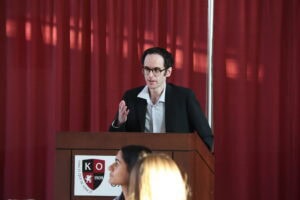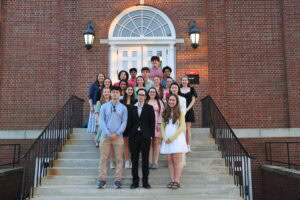April 29, 2025
A Candid Look at Journalistic Challenges
In a thought-provoking keynote at Kingswood Oxford School’s annual Baird Journalism Dinner, acclaimed journalist Eric Levitz ’06, a senior correspondent for Vox, where he covers politics and policy, delivered a sobering yet passionate reflection on the state of journalism in the United States today, but not without a sense of humor. Addressing students, faculty, and guests, Levitz painted a detailed picture of an industry under siege from economic pressures, political attacks, technological disruption, and shifting audience habits.
“I’m not sure what brought you all here tonight. Just because someone joins their high school newspaper doesn’t mean that they suffer from the debilitating psychopathology known as wanting to be a journalist,” he joked. He told the students that they might want to find a more practical occupation, such as professional gambling.
“Journalism today is having an increasingly difficult time fulfilling its traditional economic and civic functions,” Levitz began. Tracing the origins of journalism’s economic challenges, he pointed to historical changes in media consumption. In the 1920s, Americans bought newspapers not necessarily for hard news, but for cartoons, fashion photos, and classified ads. Bundling serious journalism with entertainment helped news outlets thrive. But technological shifts, starting with television and accelerating with the internet, steadily eroded that model.
Levitz explained that classified ads, once a financial backbone for newspapers, generated nearly 40% of their revenue in 2000—over $19 billion. However, digital platforms like Craigslist and Indeed decimated this crucial income stream by offering more efficient ways to connect buyers and sellers. Meanwhile, giants like Google and Instagram now dominate the corporate advertising market by harnessing massive amounts of user data, leaving traditional news outlets struggling to compete.
“Today, newspapers and magazines can’t harvest or analyze data at the same scale, and it’s left journalism with a shrinking share of advertising dollars,” Levitz said. He also warned that advances in artificial intelligence, while offering some useful tools, are further undercutting journalism by making it easier and cheaper to provide basic information—once a key way outlets attracted readers—without human reporters.
The implications go beyond economics. Levitz stressed that journalism’s civic mission—keeping the public informed and governments accountable—is under threat. Fewer people are consuming traditional news, and many turn instead to influencers, streamers, and podcasters who are not bound by professional ethics or standards of accuracy. “Democratic elections cannot compel public officials to serve their constituents’ interests if those constituents have inaccurate information about what their government has been doing,” he said. “If news outlets cannot command the public’s attention, they cannot effectively convey such information,” he cautioned.
Levitz also discussed political pressures, particularly under the current administration. He described how efforts to intimidate journalists, from lawsuits to regulatory threats against major outlets like CBS, represent a real danger to press freedom.
Despite this grim outlook, Levitz’s message wasn’t entirely pessimistic. He encouraged young people considering a career in journalism to embrace the challenge. “It’s still a great job if you can get it,” he said. “It’s an immense privilege to get to learn about the world and tell people what you’ve learned for a living. He pointed out that major institutions like The New York Times and The Atlantic have found sustainable models, and that there is still a strong demand for high-quality business and economic reporting.
In a lively Q&A session after his talk, Levitz shared practical advice with students. When asked how to find trustworthy news sources, he recommended relying on well-resourced outlets like The New York Times, The Financial Times, and The Wall Street Journal, while also supplementing with the work of thoughtful independent writers. On the role of AI, he acknowledged both the dangers and the promise: tools like OpenAI’s research assistant could help journalists work more efficiently, even as they disrupt traditional business models.
Levitz also reflected on his own experiences overcoming interview anxiety and the importance of editorial independence. “If you feel yourself resisting new information because it challenges your assumptions, that’s a cue to dig deeper,” he said, urging aspiring journalists to maintain intellectual humility and a commitment to truth over ideology.
Finally, when asked about formative experiences at Kingswood Oxford that influenced his career, Levitz credited the school’s vibrant English and creative writing programs for sharpening his skills. He recalled writing his first play for the school’s Spring Play Showcase and how it helped him grow as a storyteller.
Closing on a hopeful note, Eric called on the next generation to rise to the occasion. “Society needs journalism as much as it ever has,” he said. “We need independent, curious storytellers who can command the public’s attention in an increasingly distracted world.”
Levitz wrote a column for New York Magazine’s Intelligencer. His work has also appeared in the New York Times and Salon as well as on MSNBC’s homepage. Before entering journalism, he earned a master of fine arts in fiction writing at Johns Hopkins University and authored several plays that received productions in Baltimore and Washington, D.C.
Since the election, Levitz has been producing a weekly newsletter for Vox called “The Rebuild,” in which he explores the future of the Democratic Party, focusing on what liberals and progressives can learn from Harris’s loss.
Authors Main News
